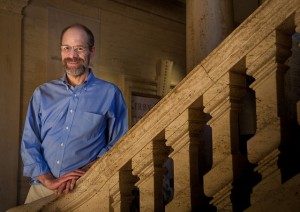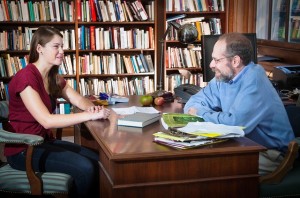Last year, Joshua Miller received one of the highest compliments a student can give a professor: “To have this type of course is why I came to college.”

Professor Joshua Miller
Those moments are what make Miller, the college professor, tick. What makes Miller, the professor of government and law, tick goes a little deeper. His interest in politics began with his parents, who were involved in many social causes of the 1950s and ’60s. His mother was a prominent trade union leader, and his father worked for a trade union and later became a leader of the American Friends Service Committee and the American Civil Liberties Union.
Miller, who heard Martin Luther King, Jr., speak on several occasions, began his political career at the age of 10 campaigning for Lyndon Johnson in his 1964 presidential race against Barry Goldwater. He became an anti-war activist in high school, then a community organizer for the Association of Community Organizations for Reform Now in Texas and Arkansas after earning his B.A. at the University of California, Santa Cruz.
By the time he entered graduate school at Princeton University, where he earned his Ph.D. in political philosophy, Miller was still undecided about whether he’d spend his life as a teacher, journalist, politician, or political activist. The title of professor gives Miller a chance to explore all his interests—politics, values, and ideas.
“During my first year in graduate school, I discovered that my fellow students were preparing for academic teaching jobs, so I thought I should, too. I have no regrets,” he says.
Politics, values, and ideas all converge in Miller’s classroom, where he considers himself a leader of class discussion rather than a lecturer. Open discussions, he says, allow students to grow in confidence and skill.
“Students usually enjoy talking and being asked to think for themselves in class and in their papers,” he says. “I like to challenge student preconceptions.”

Caroline Lang ’13 and Professor Joshua Miller talk in his office
One of Miller’s most popular courses is The Politics of Fashion. He often takes students to New York City for a tour of the Fashion District and the current exhibit at the Museum at the Fashion Institute of Technology. In fact, Miller’s current book project has the same title as the course.
Miller’s research interests focus on the intersection of politics and appearance. He has published an essay on the relationship of sexy dress to power and another on the theme of clothes as an indication of social superiority or community. He has included several students in his work as research assistants, including government and law major Caroline Lang ’13 (Yardley, Pa.).
Currently, Miller is working on the meaning of African American hairstyles. He also is interested in writing about the politics of the Islamic veil, which some view as modest and religious and some as a symbol of oppression. He is the author of The Rise and Fall of Democracy in Early America, 1630-1789 (Penn State Press, 1991) and Democratic Temperament: the Legacy of William James (University of Kansas Press, 1997). He is a recipient of the Jones Lecture Award for Distinguished Teaching and Scholarship.

